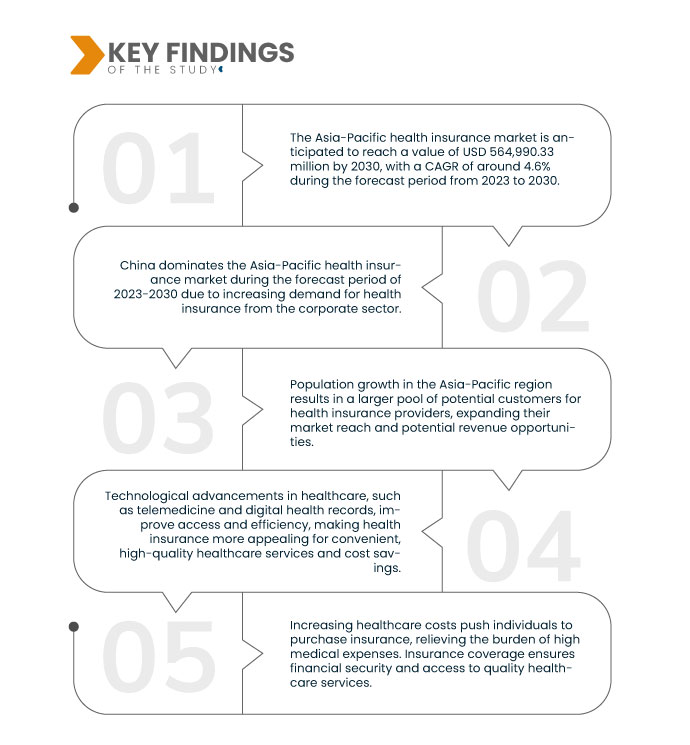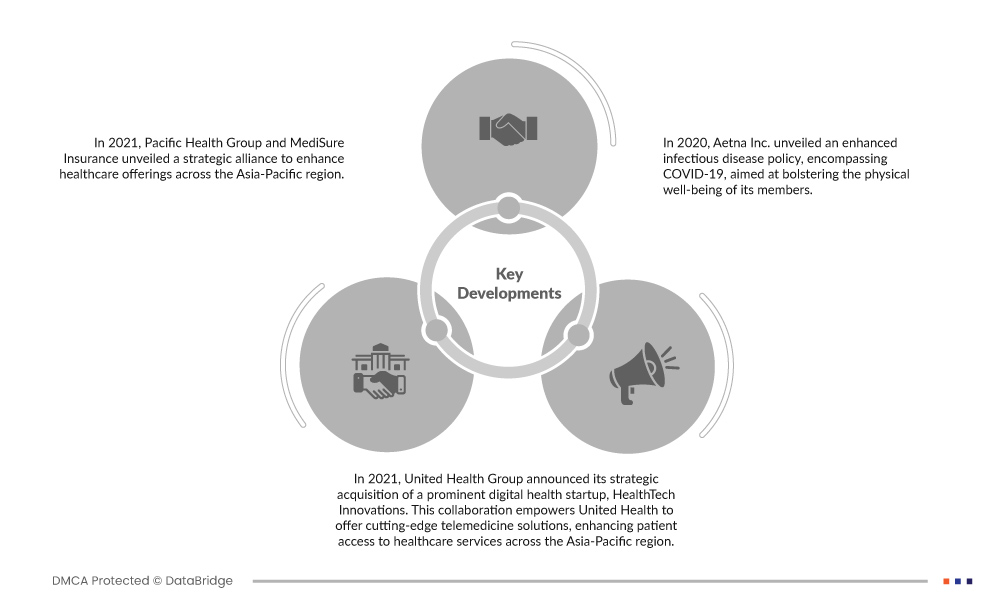Рынок медицинского страхования состоит из двух основных категорий: продукты и решения. Продукты медицинского страхования относятся к определенным полисам, которые предлагают покрытие медицинских расходов, таким как индивидуальные или групповые медицинские планы, страхование жизни и полисы критических заболеваний. Решения по медицинскому страхованию охватывают более широкий спектр предложений, включая цифровые платформы, услуги телемедицины и программы оздоровления, которые дополняют традиционное страхование для улучшения результатов и доступа к здравоохранению. Этот двойной подход касается финансовой защиты и меняющихся потребностей в здравоохранении отдельных лиц и организаций во все более сложной и взаимосвязанной сфере здравоохранения.
Доступ к полному отчету по адресу https://www.databridgemarketresearch.com/reports/asia-pacific-health-insurance-market
По данным исследования рынка Data Bridge, ожидается, что рынок медицинского страхования в Азиатско-Тихоокеанском регионе достигнет 5 64 990,33 млн долларов США к 2030 году по сравнению с 3 94 264,38 млн долларов США в 2022 году, увеличившись со значительным среднегодовым темпом роста в 4,6% в прогнозируемый период с 2023 по 2030 год. Работодатели предоставляют медицинское страхование в качестве ценного преимущества для привлечения и удержания квалифицированных сотрудников, улучшая общие компенсационные пакеты и укрепляя лояльность, что приводит к конкурентному преимуществу на рынке медицинского страхования.
Основные выводы исследования
Ожидается, что старение населения будет способствовать росту рынка.
Старение населения, глобальный демографический сдвиг, существенно влияет на спрос на услуги здравоохранения и страхования во многих странах. По мере того, как люди стареют, им часто требуется более обширная медицинская помощь и лечение хронических заболеваний, что увеличивает нагрузку на системы здравоохранения. Эта растущая потребность в медицинских услугах естественным образом повышает спрос на медицинское страхование для покрытия медицинских расходов. Это подчеркивает важную роль медицинского страхования в обеспечении финансовой безопасности и доступа к качественному здравоохранению для пожилых людей, гарантируя их благополучие на более поздних этапах жизни.
Область отчета и сегментация рынка
Отчет Метрика
|
Подробности
|
Прогнозируемый период
|
2023-2030
|
Базовый год
|
2022
|
Исторические годы
|
2021 (Можно настроить на 2015-2020)
|
Количественные единицы
|
Доход в млн. долл. США, объемы в единицах, цены в долл. США
|
Охваченные сегменты
|
Тип (продукт, решения), услуги (стационарное лечение, амбулаторное лечение, медицинская помощь, другие), уровень покрытия ( бронзовый , серебряный, золотой, платиновый), поставщики услуг (поставщики государственных медицинских страховых услуг, частные поставщики медицинских страховых услуг), планы медицинского страхования (точка обслуживания (POS), эксклюзивная организация-поставщик (EPOS), возмещение расходов на медицинское страхование, счет сбережений на здравоохранение (HSA), квалифицированные соглашения о возмещении расходов на здравоохранение для малых работодателей (QSEHRAS), предпочтительная организация-поставщик (PPO), организация по поддержанию здоровья (HMO), другие), демографические данные (взрослые, несовершеннолетние, пожилые люди), тип покрытия (пожизненное покрытие, срочное покрытие), конечный пользователь (корпорации, частные лица, другие), канал распространения (прямые продажи, финансовые учреждения, электронная коммерция , больницы, клиники, другие).
|
Страны, охваченные
|
В Азиатско-Тихоокеанском регионе (APAC) Китай, Япония, Индия, Южная Корея, Сингапур, Малайзия, Австралия, Таиланд, Индонезия, Филиппины, остальные страны Азиатско-Тихоокеанского региона (APAC).
|
Охваченные участники рынка
|
Cigna (США), Bupa (Великобритания), Now Health International (Китай), Aetna Inc. (США), AXA (Франция), HBF Health Limited (Австралия), International Medical Group, Inc. (США), Allianz Care (Ирландия), HealthCare International Global Network Limited (Великобритания), Aviva (Великобритания), MAPFRE (Испания).
|
Данные, отраженные в отчете
|
Помимо таких рыночных данных, как рыночная стоимость, темпы роста, сегменты рынка, географический охват, участники рынка и рыночный сценарий, рыночный отчет, подготовленный командой Data Bridge Market Research, включает в себя углубленный экспертный анализ, эпидемиологию пациентов, анализ воронки продаж, анализ цен и нормативную базу.
|
Анализ сегмента:
Рынок медицинского страхования Азиатско-Тихоокеанского региона сегментирован по типу, услугам, уровню покрытия, поставщикам услуг, планам медицинского страхования, демографическим данным, типу покрытия, конечному пользователю и каналу сбыта.
- По типу рынок медицинского страхования Азиатско-Тихоокеанского региона сегментируется на продукты и решения.
- По видам услуг рынок медицинского страхования Азиатско-Тихоокеанского региона сегментируется на стационарное лечение, амбулаторное лечение, медицинскую помощь и другие.
- По уровню покрытия рынок медицинского страхования Азиатско-Тихоокеанского региона сегментируется на бронзовый, серебряный, золотой и платиновый.
- По признаку поставщиков услуг рынок медицинского страхования в Азиатско-Тихоокеанском регионе сегментируется на поставщиков государственного медицинского страхования и поставщиков частного медицинского страхования.
- На основе планов медицинского страхования рынок медицинского страхования в Азиатско-Тихоокеанском регионе сегментирован на организации эксклюзивных поставщиков услуг в точках обслуживания (POS), организации эксклюзивных поставщиков услуг (EPOS), компенсационное медицинское страхование, счета сбережений на здравоохранение (HSA), квалифицированные соглашения о возмещении расходов на здравоохранение для малых работодателей (QSEHRAS), организации предпочитаемых поставщиков услуг (PPO), организации по поддержанию здоровья (HMO) и другие.
- По демографическому признаку рынок медицинского страхования в Азиатско-Тихоокеанском регионе сегментируется на взрослых, несовершеннолетних и пожилых граждан.
- По типу покрытия рынок медицинского страхования в Азиатско-Тихоокеанском регионе сегментируется на пожизненное и срочное страхование.
- По признаку конечного пользователя рынок медицинского страхования Азиатско-Тихоокеанского региона сегментируется на корпорации, частных лиц и прочих.
- По каналам сбыта рынок медицинского страхования Азиатско-Тихоокеанского региона сегментируется на прямые продажи, финансовые учреждения, электронную коммерцию, больницы, клиники и другие.
Основные игроки
Data Bridge Market Research признает следующие компании игроками на рынке медицинского страхования в Азиатско-Тихоокеанском регионе: Cigna (США), Bupa (Великобритания), Now Health International (Китай), Aetna Inc. (США), AXA (Франция), HBF Health Limited (Австралия), International Medical Group, Inc. (США).
Развитие рынка
- В 2021 году Pacific Health Group и MediSure Insurance объявили о стратегическом альянсе для улучшения предложений в области здравоохранения в Азиатско-Тихоокеанском регионе. Это партнерство будет использовать сеть Pacific Health Group для расширения покрытия MediSure, предлагая более широкий спектр услуг и укрепляя свое присутствие на рынке, принося пользу более обширной клиентской базе и обогащая свой совместный портфель услуг в сфере здравоохранения.
- В 2021 году United Health Group объявила о стратегическом приобретении известного стартапа в области цифрового здравоохранения HealthTech Innovations. Это сотрудничество позволяет United Health предлагать передовые решения в области телемедицины, расширяя доступ пациентов к медицинским услугам в Азиатско-Тихоокеанском регионе. Это значимое приобретение расширяет портфель United Health Group, позиционируя ее как лидера в области инновационного предоставления медицинских услуг.
- В 2020 году компания Aetna Inc. представила расширенную политику в отношении инфекционных заболеваний, охватывающую COVID-19, направленную на укрепление физического благополучия ее членов. Это стратегическое обновление позволяет Aetna обслуживать более широкую клиентскую базу, одновременно расширяя и диверсифицируя свой корпоративный портфель, укрепляя свои позиции на рынке медицинского страхования.
Региональный анализ
Географически в отчете о рынке медицинского страхования Азиатско-Тихоокеанского региона рассматриваются следующие страны: Китай, Япония, Индия, Южная Корея, Сингапур, Малайзия, Австралия, Таиланд, Индонезия, Филиппины, а также остальные страны Азиатско-Тихоокеанского региона (APAC).
Согласно анализу Data Bridge Market Research:
Китай будет доминирующим регионом на рынке медицинского страхования Азиатско-Тихоокеанского региона в прогнозируемый период 2023–2030 гг.
Китай лидирует на рынке благодаря частному здравоохранению, которое обеспечивает удобные приемы, более короткое время ожидания, современное оборудование, превосходное лечение и лекарства. Растущий спрос корпоративного сектора на медицинское страхование усиливает этот рост, подчеркивая важность быстрого доступа к качественному уходу. Эта тенденция подчеркивает доминирование Китая, формируя ландшафт здравоохранения региона с улучшенными услугами и корпоративными требованиями к страхованию.
Более подробную информацию об отчете о рынке медицинского страхования в Азиатско-Тихоокеанском регионе можно получить здесь – https://www.databridgemarketresearch.com/reports/asia-pacific-health-insurance-market













